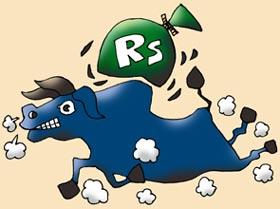|
|
| Help | |
| You are here: Rediff Home » India » Get Ahead » Money » Invest |
|
| |||||||||||||||||||||||
|
| |||||||||||||||||||||||
Talk to anyone about investments and the question that will invariably crop up is: "How long will this bull run last?"
Now all the questions may not be that direct. Some will ask you if it is alright to buy shares at the current price level. Others will ask you if it is the right time to sell.
But, what makes all of them essentially the same is the fact that to answer them accurately, one is required to be well aware of when the bull market is going to end.
And how does one do that?
 Where is the market heading?
Where is the market heading?
As time goes by and the Sensex keeps rising to newer and newer heights, the answer to this question gets more and more elusive.
This is paradoxical.
In theory, as the Sensex rises, one should be able to say that no matter at what level it will start declining, it must have moved closer to its decline just by going higher. This is not quite the case today.
Today, it sounds almost reasonable to say that the Indian economy is in the middle of a fundamental shift to a different level and the markets are simply anticipating that shift.
In the past, there have been such extraordinary shifts in many economies.
For example, sometime in the sixties, the Japanese markets set off on a bull run that lasted close to a quarter of a century (you read that right!).
There is no dearth of voices today that say that something like that is about to happen in India and we could see years, if not decades of a booming economy.
On the flip side, there have also been slumps that have lasted for extremely long periods of time.
Everyone knows about the Wall Street's Great Crash of 1929 that resulted in the Great Depression. It took the US market 20 years to revert back to the same index levels.
Certainly, as the boys from Afghanistan remind us every few months, today's world faces an extraordinarily high level of event risk. The future is unknowable in any meaningful sense.
For starters, stop trying to figure out whether it's time to buy or sell.
You cannot take that call. In fact, no one can. Timing the market is impossible.
To invest in the stock market, what is needed is a combination of approaches each of which solves a particular part of the investment problem.
Here is what I suggest:
1. Get regular
Investing regularly, regardless of where the Sensex is and where it is headed, offers the big advantage of being able to average out your costs.
Since you buy shares when they are under-priced and over-priced, it evens out over time.
2. Play safe
Choose investments that have a proven long-term record of stability. Don't look at making a quick buck just because everyone says that they have made a killing in the market.
Do not chase the highest short-term gains. If someone promises you a great return from a particular stock, don't just put in all your savings.
Doesn't matter who is buying the stock or who is recommending it. Steer clear of such ways of making a fast buck. They will land you in a soup. When you hear of a 'hot tip', run away.
Before investing in a company, gather all the information about it.
3. Allocate and rebalance
The other important idea is that of asset allocation and rebalancing. No matter how attractive the stock markets look today, it would be insane to invest all one's money in stocks.
Strike a balance between investing in stocks and in fixed income instruments like fixed deposits, bonds and the Public Provident Fund. And as different return rates change this balance, one must shift money from whatever kind of investment is not doing well to whatever is doing well.
This ensures that whenever one investment is doing well, you'll end up reaping the benefits.
One simple way of doing all these things is to invest in a few good balanced funds. These are mutual funds that divide their investments between shares and between fixed return investments. That way, the asset allocation and the rebalancing gets done by a professional fund manager.
Also, when investing in the stock market, don't put all of it into one type of stock. For instance, don't just invest only in mid-caps.
Market capitalisation of a company is its share price multiplied by the total number of shares. Based on this, companies are classified as large-cap, mid-cap and small cap. Right now, mid-caps are the rage. Read Why mid-caps are hot to understand this better.
Or, don't buy only shares of tech companies. Distribute your money around.
Have the right mindset
The surest way to make losses eventually is to try and make a huge profit in the shortest period of time.
Remember, now one knows when the bull run is to end. Maybe after 10 years or maybe by the end of this year!
If you aim to do okay, rather than brilliantly, you probably have the best chance of actually being okay.
And, remember, when people brag about how much they made, ask them how much they lost.
Stocks are risky. That stays constant, no matter how great the bull run.
Illustration: Uttam Ghosh
|
|
| © 2008 Rediff.com India Limited. All Rights Reserved. Disclaimer | Feedback |